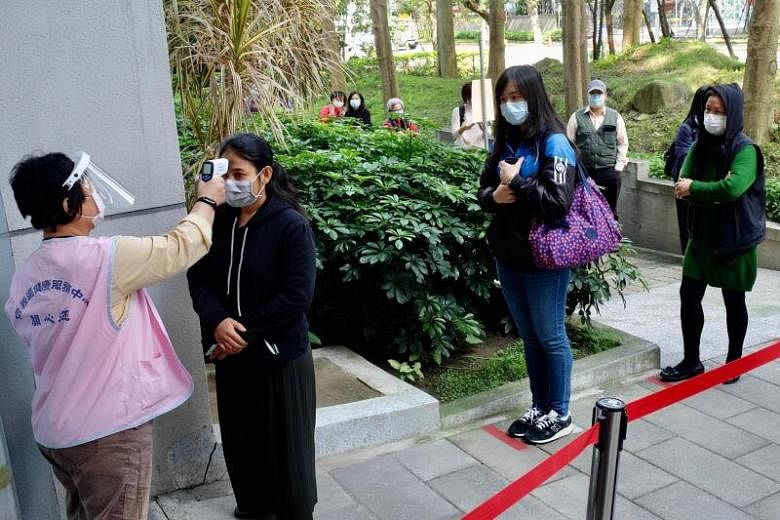TAIPEI - With its current 395 confirmed Covid-19 cases and six deaths, Taiwan has been lauded as one of the speediest areas in responding to the coronavirus outbreak now affecting the whole world.
It quickly banned the export of medical resources in its first wave of responses, which also included a travel ban for medical workers manning the outbreak front lines.
While Taiwanese have been largely supportive of the government's efforts in keeping the confirmed cases low and medical supplies in stock, some medical workers have raised concerns about loopholes that the government has overlooked and areas where it could be doing better.
"I think the government has been taking advantage of Taiwan's medical staff," Dr Lin Yi-hsueh, a 32-year-old cardiologist, told The Straits Times. He was referring to the government's travel ban for medical staff working on the outbreak prevention front lines, as well as the heavier workloads medical staff have been asked to shoulder, taking turns to work quarantine centres and screening stations at airports.
Dr Lin thinks Taiwan's government has done well in closing the island's borders to foreign visitors early in the outbreak, and making sure that only patients with appointments can access hospitals, lowering hospital transmissions.
"This is a big deal in keeping the gates shut against a mass outbreak. But I think the CECC (Central Epidemic Command Centre) should tell the public more about where each community-transmitted case is located so the residents will be more alert about where they should or shouldn't go," he said.
He said he has been called to the Kaohsiung International Airport to screen passengers flying into Taiwan for potential cases even as he works emergency room shifts in smaller suburban hospitals that are regularly short-staffed.
"The government gets to decide if people who came in (varying degrees of) contact with confirmed cases are 'at risk' or not, and only the government will know the actual level of risks each confirmed or potential case poses," said Dr Lin, who brought up Case 134 as an example of what the government could have been more transparent with the public about.
"This is a woman who works as a Chinese doctor in a big hospital, where her husband also works as a doctor. They were in contact with so many people, something the government didn't make public, nor did it shut down the hospital," said Dr Lin.
This is especially crucial when over 80 per cent of Taiwan's confirmed cases were imported.
According to Dr Lin, many of these returning Taiwanese who exhibit coronavirus-like symptoms tend to be optimistic and visit local clinics first to treat their "colds" instead of getting screened at bigger hospitals.
"So the people really at risk are the clinic doctors and staff, who need to know clearly if they have been in touch with confirmed or suspected cases," he said.
Other loopholes Dr Lin believes the government could have closed include making it mandatory for airline crews to get screened after each flight, and ramping up punishments to make it illegal to leave Taiwan or quarantine location during the outbreak, something chest medicine department nurse Irene Liang agrees with.
"I really hope that the government can punish these selfish people. Although we say reason and emotions come before the law, at times like these, using coercive force and public power is really necessary," said Ms Liang, 25.
"Because the government didn't ban Taiwanese from travelling, our imported cases skyrocketed and who had to carry that burden? The medical workers," said Dr Lin, who added that nurses like Ms Liang have to work harder than ever now because caretakers hired by patients' families are now banned from entering isolation wards and intensive care units, thus requiring the nurses to stay with patients 24/7.
Other healthcare workers hope the government can be more transparent about how much medical supplies are readily available for hospitals.
A photo leaked by an emergency room doctor working in a Hsinchu hospital last month showed doctors wearing plastic rain ponchos on their shift due to a protective suit shortage, something the government has denied.
"For crucial supplies like this, it makes me furious seeing the government promise over and over again that there are enough suits when (the photo) is the reality," said Dr Tu, a 31-year-old doctor who works at the Hsinchu hospital and asked to be identified by his surname only.
More protective suits were sent to the hospital on the same day the photo was published by local media, said Dr Tu.
Taiwan reported zero new cases on Tuesday (April 14) and Thursday this week, and currently has 155 cases discharged from quarantine and a 39.2 per cent recovery rate.
CECC head Chen Shih-chung said the numbers indicated "good progress", but "(we) shouldn't let our guards down because with just one careless omission, the cases will increase rapidly".












